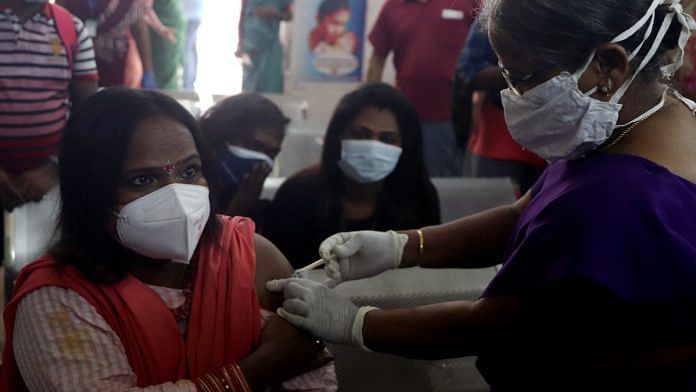New Delhi: A substantial third wave of Covid-19 could occur but it may not be as large as the second wave, a study by the Indian Council of Medical Research (ICMR) has found.
The study titled ‘Plausibility of a third wave of COVID-19 in India: A mathematical modelling based analysis’, published Friday in the peer-reviewed Indian Journal of Medical Research, demonstrated “plausible mechanisms by which a substantial third wave could occur, while also illustrating that it is unlikely for any such resurgence to be as large as the second wave”.
However, the researchers warned that the projections were subject to uncertainties and scaling up vaccinations is the only way to “mitigate against any eventuality”.
The study was conducted by Dr Balram Bhargava, director general of ICMR, Sandip Mandal, Samiran Panda and Nimalan Arinaminpathy.
Mandal works at ICMR’s clinical studies, projection and policy unit and Panda is head of the division of epidemiology and communicable diseases at the organisation. Arinaminpathy, meanwhile, is an expert of mathematical modelling at School of Public Health, Imperial College London.
Also read: Blocked by Eli Lilly, Bajaj Healthcare moves patent office to make Covid drug Baricitinib
The study
For the study, researchers examined four potential mechanisms of the third wave of Covid-19 using a compartmental model of SARS-CoV-2 transmission.
In the first mechanism, the possibility of waning immunity was considered that would put previously exposed individuals at risk. The emergence of a new viral variant that is capable of escaping immunity to previously circulating strains was examined in the second model.
The third mechanism involved the emergence of a new viral variant that is more transmissible than the previously circulating strains and the fourth examined the likelihood of transmission with the lifting of lockdown curbs.
The study concluded that the immune-mediated mechanisms — such as waning immunity or immune-escaping viral evolution — are unlikely to lead to a severe third wave on their own unless previously exposed people lose their protection completely.
Moreover, the researchers noted that a new, more transmissible variant will also need to have a very high infection rate (R0 >4.5) to cause a third wave on its own. R value refers to the rate at which an infection spreads within the population.
The study, however, did mention two mechanisms where a severe third wave is possible. First is a new variant that is more transmissible and is also capable of escaping prior immunity and second, when “lockdowns that are highly effective in limiting transmission and subsequently released”.
“Despite an intense rate of transmission, state-wide lockdowns in Delhi and Maharashtra may have been impactful in mitigating the second wave in these States. The potential for the lifting of such restrictions to allow a third wave was modelled,” it notes.
And yet, the researchers mention that even in these two cases, it is unlikely that the third wave will be as severe as the second one.
They added that scaling up vaccinations could play an important role in mitigating these and future waves of the disease.
Also read: Govt readies 2 more testing labs to prepare for new Covid vaccines coming to market



